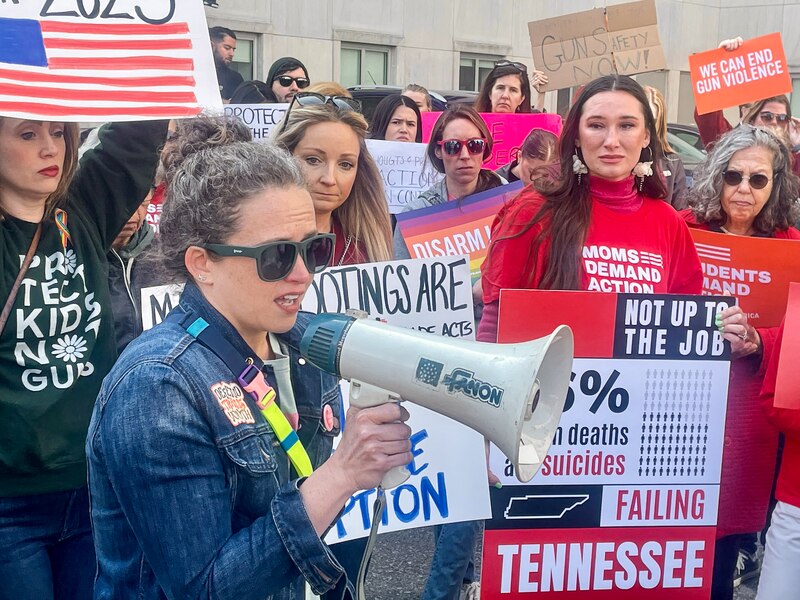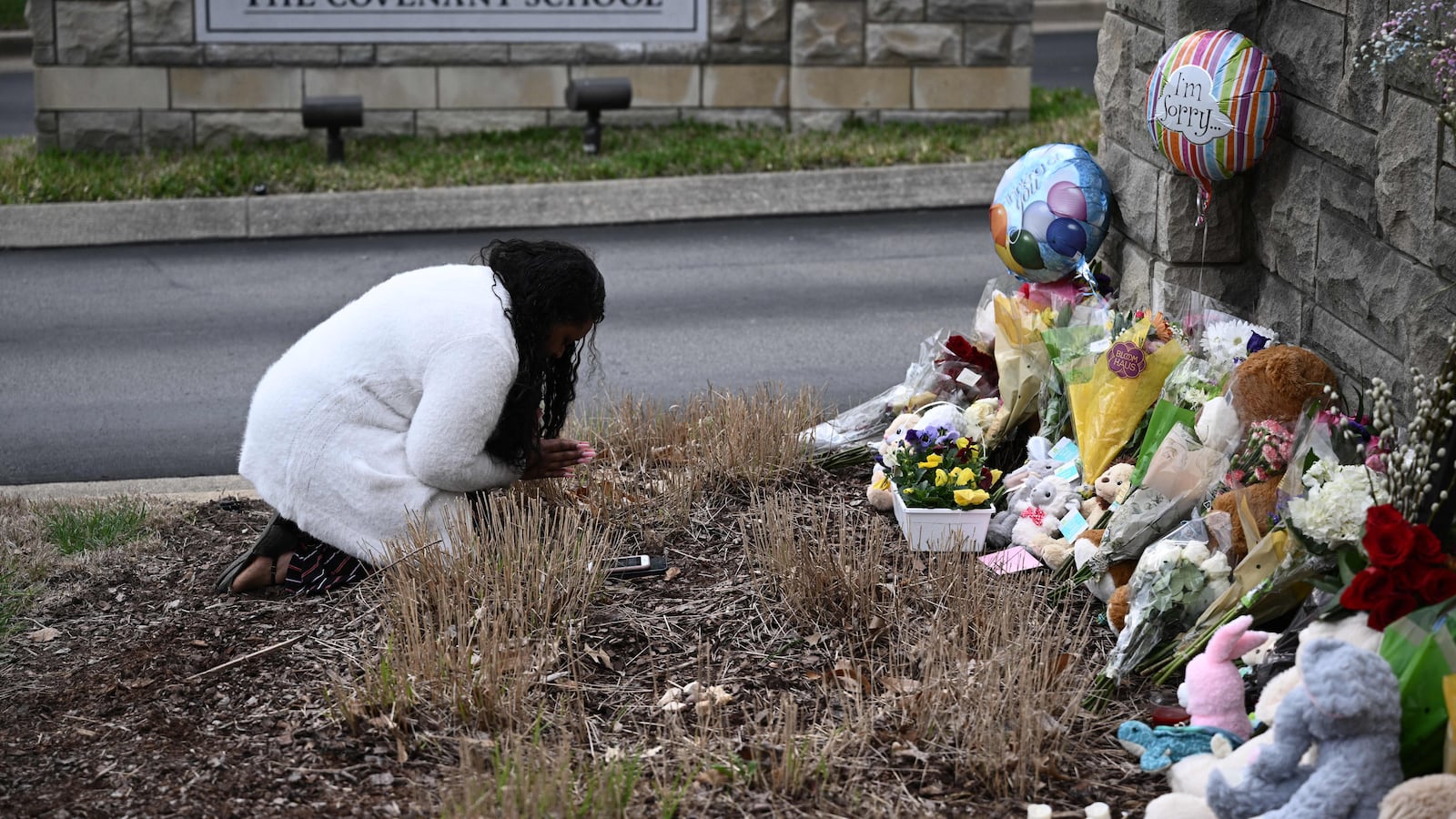Nashville teacher Charlene Culbertson arrived at work early Tuesday morning. But she hesitated to walk into the building, a public elementary school not far from the church school where a shooter had killed three children and three adults a day earlier.
“I sat in my car until I felt like I had a good enough mask on to be who my kids expect to see,” said Culbertson, who teaches 20 preschoolers at Shwab Elementary School.
“My little students seem fine today, but I am not,” she said. “This has been a hard day.”
Teachers and students returned to class at Metropolitan Nashville Public Schools after police released chilling video footage overnight showing how a 28-year-old intruder, armed with two rifles and a pistol, shot through a glass door to The Covenant School in Nashville’s affluent Green Hills community.
The shooter, who had legally purchased multiple firearms from five Nashville-area gun stores, entered the school and began firing at students and staff before being killed by a police SWAT team.
Monday’s attack brings the U.S. count to 15 mass school shootings — resulting in the deaths of four or more people — since 1999’s Columbine High School massacre in Colorado, according to The Associated Press.
“Hearing all of this is heartbreaking. We’re scared,” said 16-year-old Jennie Li, who decided to come to a rally at the Capitol with her younger sister, Mary, instead of going to class at the magnet school they attend in downtown Nashville. They wanted their student voices heard.
Tennessee has one of the nation’s highest rates of gun deaths, including murders, suicides and accidental shootings. It also has some of the most permissive gun laws.
In 2021, it enacted a law that lets most Tennesseans 21 and older carry handguns without first clearing a background check, obtaining a permit, or getting trained on firearms safety. “Guns are essentially ubiquitous” in the state, a part of the culture, said Nashville Mayor John Cooper.
And state lawmakers in the Republican-controlled legislature are considering numerous pieces of gun legislation to make firearms even more prevalent.
One bill, sponsored by Sen. John Stevens of Huntingdon and Rep. Rusty Grills of Newbern, would drop that age from 21 to 18. The House version would let people carry rifles and shotguns in public without a permit.
Another bill, sponsored by Sen. Paul Bailey of Sparta and Rep. Ryan Williams of Cookeville, would allow faculty or school staff members to carry a concealed handgun on school grounds with a permit.
Both measures were scheduled for votes Tuesday in various committees but, after Monday’s deadly shooting, legislative leaders delayed taking up any contentious gun-related legislation until next week.
“Yesterday was a tragic event in this country and this state and in Nashville, and we need to be respectful of those victims and the families of those victims,” said Sen. Todd Gardenhire, a Chattanooga Republican who chairs his chamber’s judiciary committee.
Gov. Bill Lee agreed. He signed the controversial law to loosen restrictions for gun ownership and has questioned the effectiveness of red flag laws that would restrict gun access for people who are most likely to misuse them.
“There will come a time to discuss and debate policy,” but not immediately, Lee said in a video message released late Tuesday. He called on Tennesseans first to pray for the families of the victims and the shooter, the school, police, and others “who are hurting and angry and confused.”
Among the hurting is Becca Dryden, a Nashville parent who spoke at a rally outside of legislative offices in downtown Nashville. About a hundred people showed up to the Tuesday event, sponsored by Moms Demand Action for Gun Sense in America, which has a chapter in Tennessee.
“This is a really scary time to be a parent,” Dryden said through tears, “and I just want my kids to live a full life. I want them to live. I want to pick them up from school every day — alive.”

Amanda Rosenberger, a college professor in Cookeville, said she survived a 1992 school shooting while attending Bard College at Simon’s Rock in Massachusetts — and still carries the trauma with her every day.
“I’m tired of seeing people crying on the television. I’m tired of it,” Rosenberger said. “I don’t want to be one of those people any more. We need to stand up for our kids.”
Linda McFadyen-Ketchum, a retired teacher who leads the advocacy group’s Tennessee chapter, criticized GOP leaders for delaying business on gun legislation. The time to act, she said, is now, while the slayings of 9-year-olds Evelyn Dieckhaus, Hallie Scruggs, and William Kinney and school staff members Katherine Koonce, Mike Hill, and Cynthia Peak were fresh on everyone’s minds.
“I don’t have any more tears, y’all,” McFadyen-Ketchum told the crowd. “We’ve been crying since Sandy Hook. We’re cried out. We don’t need a day to mourn. We need a day of action.”
On the other side of Nashville, eighth-grade teacher Kelly Ann Graff had lots of tears. She cried on the way to work on Tuesday. To get through the school day, she put her emotions on the back burner and tried to support her students by answering their questions honestly in an age-appropriate way.
But she’s also worried about the well-being of her co-workers at Thurgood Marshall Middle School, as well as educators across the nation who are overworked, underpaid, undersupported, and grappling with the growing threat of gun violence.
The teachers are not OK, she said.
“I’m very afraid of us moving on too quickly from this event,” Graff said. “I’m afraid that prioritizing normalcy will enable this new normal of mass school shootings. This shooting hit close to home, and that’s a fact that we need to sit with.”
Marta Aldrich is a senior correspondent and covers the statehouse for Chalkbeat Tennessee. Contact her at maldrich@chalkbeat.org.

